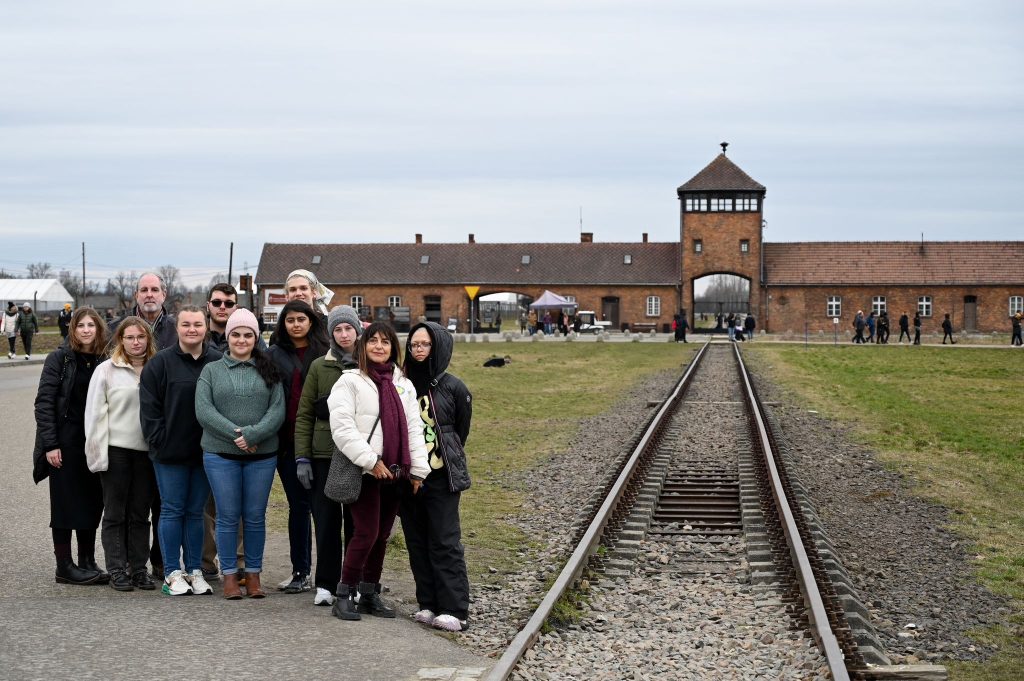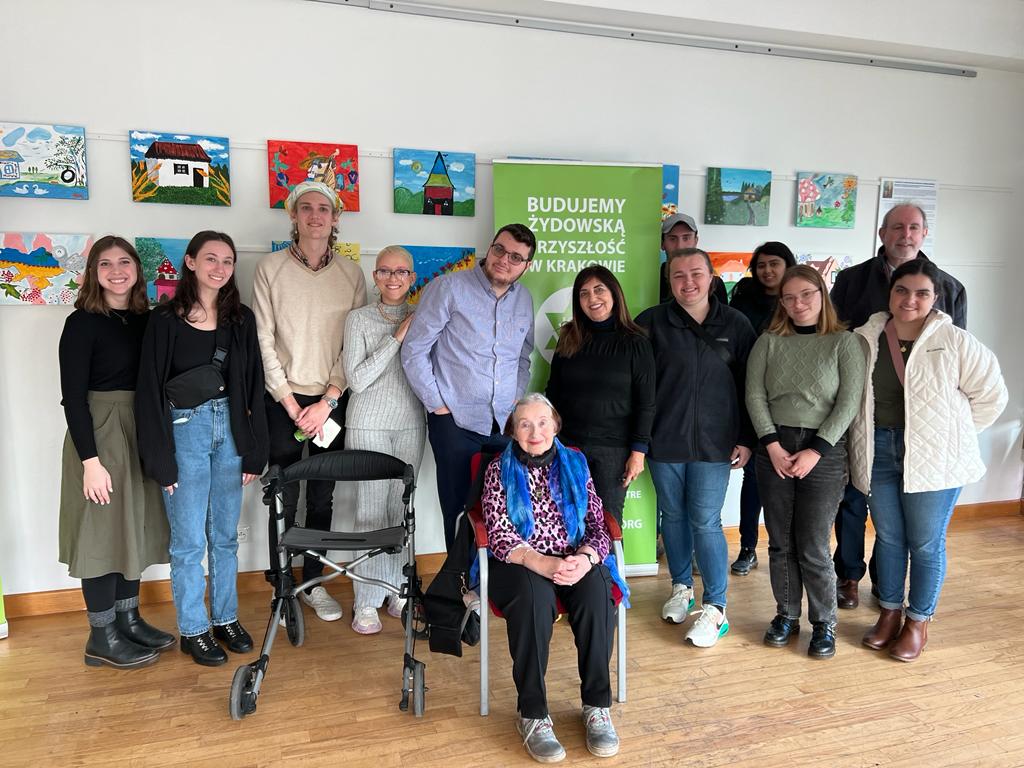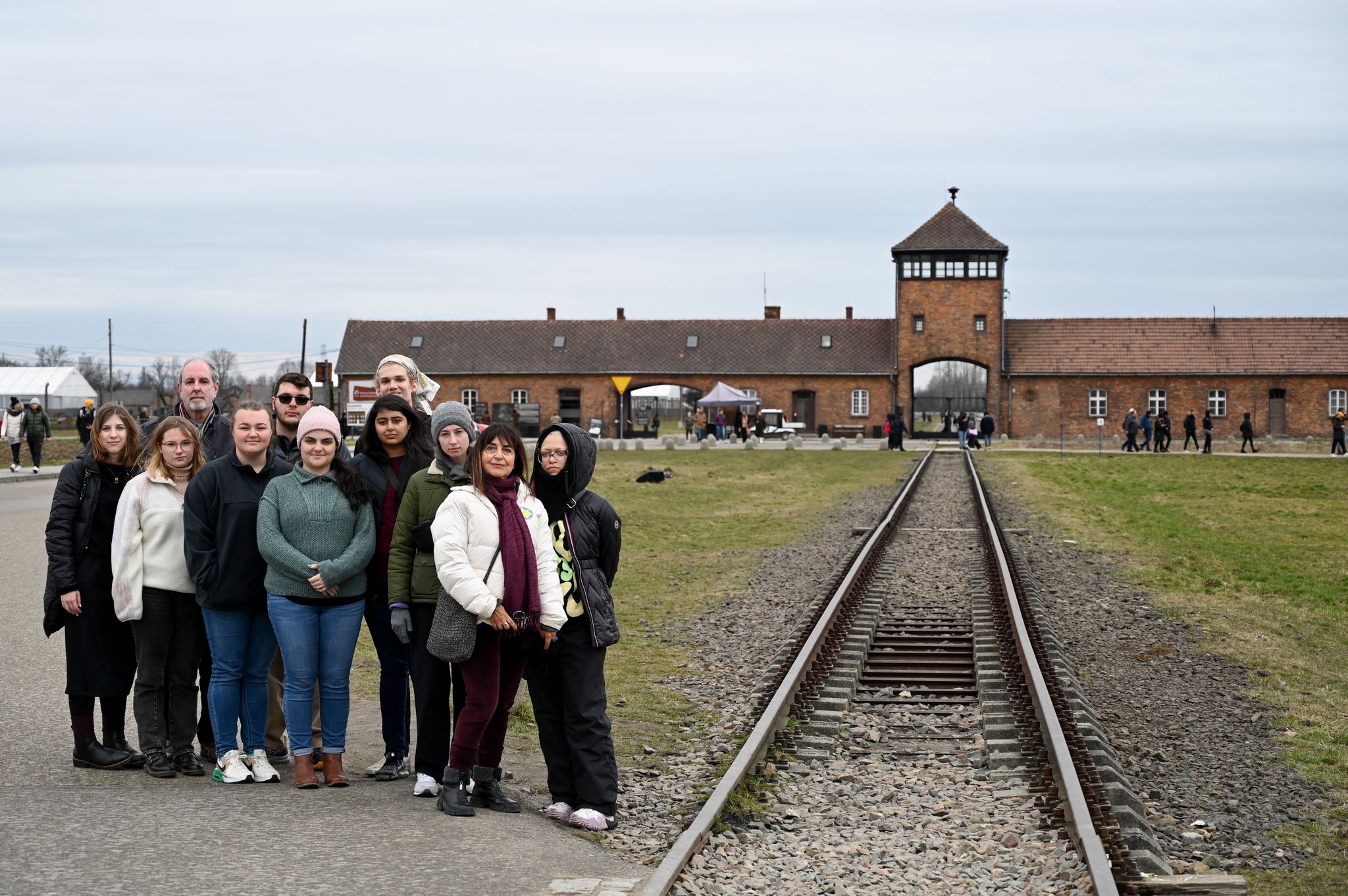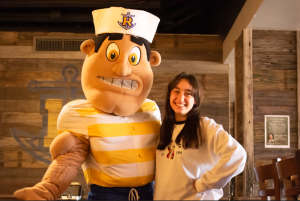
This spring is the fourth time that Dr. McLaughlin and I have team-taught our RFLA 300 “Learning and Teaching about the Holocaust.” Yet, our field study, which is built into our course, was canceled three times due to the pandemic and the Russian invasion of Ukraine. This spring, we made the journey to Krakow and Auschwitz-Birkenau. As our students shared in class, although they were well-educated about the history of this genocide, the tactile experience of walking the grounds of the concentration and death camps, left an indelible mark. The following are student statements about the most impactful experiences during this field study.
Benjamin Mack-Jackson: “The most impactful aspect of the field study in Poland was visiting the Auschwitz concentration camp. Although this was my second time visiting the camp, I was still struck by the overwhelming sense of loss and despair as I walked the ground. The sight of the destroyed gas chambers is particularly haunting, as they sit quietly rubbled amidst endless rows of intact, restored buildings. Visiting the locations where the tragic events of the Holocaust unfolded is always an emotional and impactful experience, and I’m grateful for the opportunity to have participated in this trip.”
Jacob Fuentes: “For me, I will never forget seeing a room of photographs seized from the prisoners of Auschwitz. It is impossible to really process everything when you are there. The enormity of the devastation is just too much to process. As a result, your mind selects one thing to latch onto and that is what you remember. Those smiling faces will follow me forever.”

Abbey Matusik: “The harshness of the terrain at Auschwitz really struck me. Walking across the seemingly never-ending camp, large and uneven stones forced us to walk with intense caution to avoid tripping. I kept imagining the prisoners who had to wear wooden shoes that often did not fit their feet and how intense the pain must have been. Though I can never literally put myself in their shoes, this experience allowed me to better understand the brutality which prisoners endured here.”
Kate Hartman: “Meeting Zoysia, a holocaust survivor, was the most impactful experience for me. Throughout the war, she concealed her Jewish identity. She was not free to practice her Judaism until 1989, but that did not disrupt her faith. Zoysia had her Bat Mitzvah in her 80s, where she was supported and celebrated by the Krakow JCC. I found her faith journey admirable and inspiring.”
Grace King: “We visited a synagogue with stained-glass windows which are the only ones to have survived the Shoah, but the part that I think is more worth noting is the why. He stated it is because the Nazis used this specific synagogue as a horse stable and they did not want the horses getting cold, so they did not break the windows. This shocked me in a new way. To think that the place so many would worship in and kept as such a holy place, to be reduced to animal housing was insane.”
Liam King: “My perspective of Auschwitz differed between my identities. As a Holocaust educator, witnessing Auschwitz for the first time with my own eyes was a radical experience. The hazy imaginary I had cultivated in my mind of these places was completely overridden by the scale of the camps, the cold of the snow, and the grit of every red brick which can collectively be called ‘Auschwitz’. As a queer student, though, my experience was less intellectual. I remember stepping into the gas chamber and experiencing pure panic and distrust. Was this all a trick? The whole time I was in Auschwitz trust and distrust battled within me as I tried to comprehend the tragedies which took place in the very spots where I stood.”
Dara Manka: “Going on this trip, my most impactful experience was talking with Zoshya. She was a holocaust survivor who had to give up her whole identity to make it through the war. She talked about how one should not have fear because if you fear life, you can never truly live. She talked about if she let fear hold her down, then she would not be where she is today, which is an essential lesson for the youth of this generation.”
Fariha Syed: “My experience on the Poland field study was one that will stay with me for the rest of my life. From walking through the gates of Auschwitz-Birkenau II. Not being able to see the whole camp from my naked eye was so overwhelming. It made me realize how calculated everything was. It made me think of what are my next steps after returning home?”
The students’ visit to the site where the crimes against humanity were perpetrated, added an important dimension to their knowledge and understanding of the Shoah, the Hebrew word for the Holocaust. Their comments bear witness to the importance of Holocaust education and to Rollins’ commitment to social justice and global citizenship.









Comments are closed.